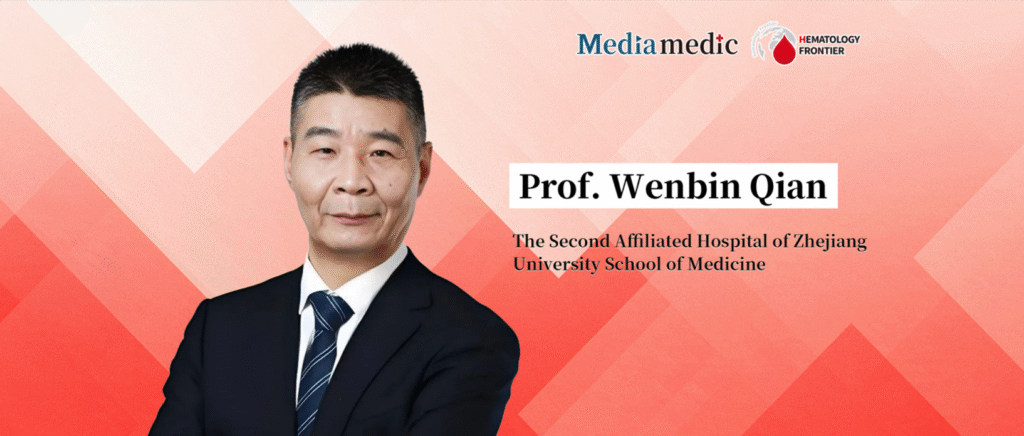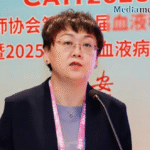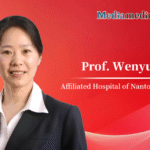
As summer bloomed in Shanghai and the tide of the Huangpu River caught the morning light, the 2025 Hematology Translational and Innovation Conference, held in parallel with the 10th Shanghai Lymphoid Disease Symposium, took place from June 27 to 29. This major academic event welcomed prominent experts from China and abroad to share cutting-edge achievements, promote the integration of basic science and clinical application in hematology, and foster broad exchanges around emerging therapies, professional training, and science communication.During the conference, Professor Wenbin Qian from the Second Affiliated Hospital of Zhejiang University School of Medicine delivered a presentation titled “Recent Advances in CAR-NK Cell Therapy for Lymphoma and Next-Generation Strategies.” He shared the latest breakthroughs in this emerging immunotherapy, offering both theoretical and practical guidance for its clinical application. Oncology Frontier – Hematology Frontier presents this detailed summary for our readers.
In recent years, chimeric antigen receptor-natural killer (CAR-NK) cell therapy has emerged as a novel immunotherapy showing remarkable potential in lymphoma treatment. Professor Qian provided a comprehensive overview of its progress, including updates on clinical research, innovative therapy design, translational studies, and resistance mechanisms, aiming to provide a foundation for continued development in the field.
1. Current Landscape of CAR-NK Cell Therapy
As a rapidly advancing form of immunotherapy, CAR-NK cell therapy has seen consistent growth in the number of clinical trials worldwide. From just 1 registered study in 2017, the global total rose to 108 trials by 2024, covering both hematologic malignancies and solid tumors. In hematologic cancers, research has focused on targets such as CD19, BCMA, and NKG2D, while targets like TROP2, GPC3, and 5T4 are gaining traction in solid tumors.
Compared to CAR-T therapy, CAR-NK therapy offers several advantages. It carries a lower risk of graft-versus-host disease (GVHD), which improves safety. It also supports off-the-shelf production, allowing the therapy to be manufactured and stored in advance. Moreover, CAR-NK therapies are associated with reduced incidence of cytokine release syndrome (CRS) and neurotoxicity, further enhancing tolerability. In addition, CAR-NK cells have multiple tumor-recognition mechanisms, including antigen-independent cytotoxicity, enabling broader tumor targeting. Research by Professor Qian’s team has shown that CAR-NK cells also possess the potential to overcome antigen escape. However, some challenges remain—such as limited persistence of CAR-NK cells in vivo and poor infiltration into solid tumors.
Structurally, the CAR used in NK cells typically consists of an extracellular domain, a transmembrane domain, and an intracellular signaling domain. The extracellular domain includes a signal peptide, a single-chain variable fragment (scFv) for antigen recognition, and a hinge region. Together with regulatory elements, these components determine the overall efficacy of the CAR. First-generation CARs include a synthetic receptor, a transmembrane domain, and a basic signaling unit. Second- and third-generation CARs incorporate one or more co-stimulatory domains. With further engineering, CAR constructs have now reached a fourth generation, incorporating co-stimulatory molecules and cytokine signaling elements to enhance both antitumor potency and in vivo persistence.
A recent Chinese study designed seven CD19-directed CAR constructs and used retroviral systems to express them in NK cells. These were evaluated for their antitumor activity and persistence. All constructs enhanced the NK cells’ cytotoxic potential and extended survival in tumor-bearing mice. Among them, CAR1 (comprising a CD8 transmembrane domain and CD3ζ signaling domain) demonstrated the most outstanding therapeutic efficacy. When combined with the OX40 co-stimulatory domain, it also showed enhanced persistence, highlighting a promising direction for future CAR-NK development.
2. Clinical Advances of CAR-NK Cell Therapy in Lymphoma
In recent years, clinical research on CAR-NK cell therapy for lymphoma has yielded encouraging results. The first clinical trial using umbilical cord blood-derived CD19 CAR-NK cells demonstrated notable efficacy: among 11 treated patients, 4 with lymphoma and 3 with chronic lymphocytic leukemia (CLL) achieved complete remission. In patients with diffuse large B-cell lymphoma (DLBCL), durable complete responses lasted up to 13 months. Responses were observed rapidly across all dose levels, typically within 30 days of infusion. The CAR-NK cells expanded in vivo and persisted at low levels for at least 12 months.
At The University of Texas MD Anderson Cancer Center, a Phase I/II clinical trial reported favorable outcomes in 37 patients with relapsed or refractory B-cell malignancies treated with umbilical cord blood-derived CD19-targeted CAR-NK cells. The overall response rate (ORR) at both day 30 and day 100 was 48.6%. One-year progression-free survival was 32%, and overall survival reached 68%. The therapy showed benefits across different subtypes of B-cell malignancies: low-grade non-Hodgkin lymphoma had an ORR of 100% at day 30, untreated CLL had an ORR of 67%, and DLBCL patients showed an ORR of 41%.
At the 2024 ASH Annual Meeting, results from the TAK-007 study were presented. TAK-007 is an off-the-shelf, allogeneic, umbilical cord blood-derived CD19 CAR-NK cell product. A total of 26 patients with large B-cell lymphoma (LBCL) or indolent non-Hodgkin lymphoma (iNHL) received treatment, with half treated in outpatient settings. The median number of prior systemic therapies was five (range: 2–11), and nine patients (eight with LBCL and one with iNHL) had previously received anti-CD19 CAR-T therapy. The median time from enrollment to lymphodepletion was 8 days. The overall ORR was 53.8%. Among the 23 patients treated with 800 million TAK-007 cells, 14 (61%) achieved a response. In the iNHL subgroup, the ORR was 77.8% with a complete remission (CR) rate of 55.6%, and the median duration of response was 4.9 months. For LBCL, the CR rate was 21.4% with a median duration of response of 2.6 months. Clinical responses were observed across a range of pre-infusion CD19 antigen densities, indicating the potential to overcome antigen escape. Within 10 days of TAK-007 infusion, three patients experienced cytokine release syndrome (CRS)—two with grade 1 and one with grade 2. No cases of immune effector cell-associated neurotoxicity syndrome (ICANS) were observed within 60 days of treatment, and no significant elevations in pro-inflammatory cytokine levels were detected.
FT596 is an induced pluripotent stem cell (iPSC)-derived CAR-NK therapy engineered with three anti-tumor features: a CD19-specific CAR, a high-affinity non-cleavable CD16 Fc receptor, and an IL-15/IL-15 receptor fusion protein to support persistence. Professor Armin Ghobadi from Washington University published the first-in-human Phase I clinical study of FT596 in The Lancet, evaluating its safety and tolerability as monotherapy and in combination with rituximab in relapsed or refractory B-cell lymphoma. The study reported highly encouraging preliminary efficacy, particularly in follicular lymphoma, where the ORR reached 100%, including an 85% complete remission rate. In large B-cell lymphoma, the ORR was 38% with a CR rate of 25%. Notably, in patients previously treated with CAR-T cells, FT596 still achieved a 30% CR rate. The study also found that NK cell levels peaked rapidly after infusion and remained detectable for up to 15 days.
3. Innovative CAR-NK Therapies for DLBCL
In the field of innovative CAR-NK therapies, several preclinical studies and early-phase clinical trials have demonstrated the safety, efficacy, and therapeutic potential of lentiviral vector-engineered CAR-NK cells for the treatment of diffuse large B-cell lymphoma (DLBCL). One notable approach involves the use of baboon envelope-pseudotyped lentiviral vectors (BaEV-LV) to transduce umbilical cord blood-derived NK cells, generating CD19-specific CAR-NK cells that co-express interleukin-15 (IL-15) to promote proliferation and persistence. These constructs incorporate intracellular signaling domains such as 4-1BB and CD3ζ, forming the CD19-BBζ CAR-NK design. This strategy represents a “universal” approach to advancing lymphoma immunotherapy.
Additionally, novel CAR-NK therapies targeting CD70, CD19, and dual-targeted CD70/CD19 antigens are emerging as promising platforms with clinical application potential. Professor Wenbin Qian’s team explored a modified infusion schedule involving two separate infusions (administered on Day 3 and Day 8 at a 10:1 ratio). The results were striking—CD70-directed CAR-NK cells carrying IL-15 demonstrated potent antitumor activity, providing new evidence to support the redesign of CAR-NK dosing strategies.
4. Translational Research on Cord Blood-Derived CD19 CAR-NK Therapy for DLBCL
A Phase I dose-escalation trial (NCT05472558) was conducted in eight patients with relapsed or refractory diffuse large B-cell lymphoma (DLBCL) to evaluate repeated infusions of cord blood-derived CD19 CAR-NK cells. The study achieved its predefined endpoints. Primary outcomes included safety, maximum tolerated dose (MTD), and overall response rate (ORR), while secondary endpoints covered duration of response, overall survival, and progression-free survival. No dose-limiting toxicities were observed, and the MTD was not reached. Importantly, there were no cases of cytokine release syndrome (CRS), neurotoxicity, or graft-versus-host disease (GVHD).
By Day 30, the ORR was 62.5%, with four patients (50%) achieving complete remission. The median progression-free survival was 9.5 months, and the median overall survival had not yet been reached. Post-treatment exploratory single-cell RNA sequencing revealed molecular features associated with CAR-NK efficacy, as well as interaction networks between immune cells that were linked to therapeutic outcomes.
5. Investigating Resistance Mechanisms in CAR-NK Therapy for Lymphoma
While CAR-NK cell therapy has shown promising clinical activity in lymphoma, some patients still develop resistance. Studies have identified product heterogeneity as a potential factor affecting treatment efficacy. Subpopulation analysis of CAR-NK products revealed functional and transcriptional differences between subsets. For example, the NK0 subpopulation was characteristic of progressive disease (PD), while NK4 cells exhibited high NF-κB and low MHC-II expression. Identifying the functional signatures of these subgroups may help predict treatment responses and guide personalized therapy.
In addition, changes in peripheral immune cell profiles were also found to correlate with therapeutic outcomes. In patients achieving complete remission (CR), there was a significant increase in antigen-presenting and cytotoxic cells in the peripheral blood. In contrast, CD4+ T cells in patients with PD exhibited an immunosuppressive phenotype. Furthermore, the strength of antigen presentation signaling between NK cells and monocytes was significantly higher in CR patients than in those with PD.
New research has also identified the transcription factor cAMP response element modulator (CREM) as a key regulator of NK cell effector function. In tumor models where adoptively transferred CAR-NK cells exert optimal antitumor activity, CREM expression was significantly induced. Deletion of CREM markedly enhanced the cytotoxic function and cytokine secretion of CAR-NK cells both in vitro and in vivo, and conferred resistance to functional exhaustion in tumor rechallenge models. These findings suggest that targeting the CREM signaling axis may be a promising strategy to further optimize CAR-NK therapy.
Collectively, these insights point to several strategic directions for overcoming resistance and improving NK cell-based therapies. These include developing robust in vitro expansion systems to support scalable manufacturing, engineering memory-like NK phenotypes to improve persistence, designing multi-targeted CAR constructs or combination therapies to address tumor antigen heterogeneity, and formulating strategies to modulate the tumor microenvironment for enhanced efficacy.
Conclusion As a novel and rapidly evolving immunotherapy, CAR-NK cell therapy continues to demonstrate significant clinical potential across various indications. In recent years, improvements in CAR structure, the integration of co-stimulatory domains and cytokine signaling elements, and the development of new therapeutic strategies have markedly enhanced both efficacy and safety. With continued progress in basic research and clinical investigation, CAR-NK therapies are poised to offer increasingly effective and accessible treatment options for patients in need.

Second Affiliated Hospital, Zhejiang University School of Medicine
Professor Wenbin Qian serves as Director of the Department of Hematology and Director of the Center for Biotherapy at the Second Affiliated Hospital of Zhejiang University School of Medicine. He is also Chief Scientist of the National Key R&D Program “Science and Technology Innovation 2030.”
He holds several academic and leadership positions, including: – Member, Hematology Branch, Chinese Medical Doctor Association – Standing Committee Member, Hematologic Oncology and Tumor Hematology Committees, Chinese Anti-Cancer Association – Member, Lymphoma Committee, Chinese Anti-Cancer Association – Vice Chair, Lymphoma Committee, Chinese Association of Geriatric Health Care – Member, Lymphoid Disease and Infection Groups, Chinese Society of Hematology – Chair, Hematology Branch, Zhejiang Medical Association
Professor Qian has published over 90 peer-reviewed papers as first or corresponding author in high-impact international journals, including Cell Discovery, eClinicalMedicine, Clinical Cancer Research, Leukemia, Haematologica, Blood Cancer Journal, Cancer Communications, Journal of Hematology & Oncology, Signal Transduction and Targeted Therapy, Cellular & Molecular Immunology, and The Lancet Hematology.
He is co-editor of two national expert consensus documents: Guidelines for Clinical Management of CAR-T Cell Therapy Toxicities in NHL and Multidisciplinary Management of CAR-T Cell Therapy in Lymphoma, both published by Tsinghua University Press in 2021. He also contributed as associate editor to CAR-T Cell Immunotherapy (People’s Medical Publishing House, 2021) and Case-Based Interpretation of Tumor Cell Therapy (Shanghai Science & Technology Press, 2024).
Professor Qian has led or participated as principal investigator in seven major projects funded by the National Natural Science Foundation of China (NSFC), including key and exploratory programs, and has directed several key projects under Zhejiang Province’s R&D initiatives. His contributions have been recognized with two national second-class prizes for scientific and technological progress and nearly ten provincial-level first and second prizes.


